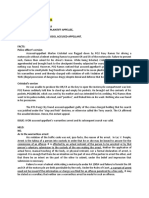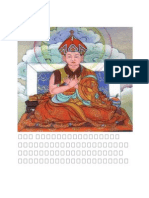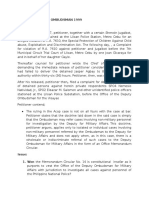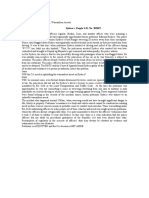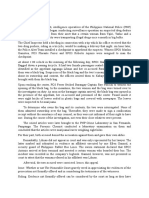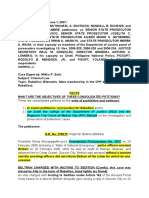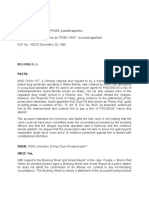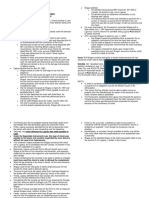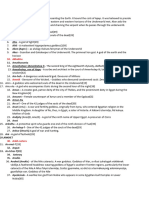Tanenggee v. People
Tanenggee v. People
Uploaded by
qwertyCopyright:
Available Formats
Tanenggee v. People
Tanenggee v. People
Uploaded by
qwertyOriginal Description:
Copyright
Available Formats
Share this document
Did you find this document useful?
Is this content inappropriate?
Copyright:
Available Formats
Tanenggee v. People
Tanenggee v. People
Uploaded by
qwertyCopyright:
Available Formats
Tanenggee v. People, GR 179448, 26 June 2013.
DEL CASTILLO, J.
FACTS: Five separate informations for estafa through falsification of commercial
documents were filed against Tanengge.
The prosecution alleged that on different occasions, appellant caused to be prepared
promissory notes and cashier’s checks in the name of Romeo Tan, a valued client of
the bank since he has substantial deposits in his account, in connection with the
purported loans obtained by the latter from the bank. Appellant approved and signed
the cashier’s check as branch manager of Metrobank Commercio Branch. Appellant
affixed, forged or caused to be signed the signature of Tan as endorser and payee of the
proceeds of the checks at the back of the same to show that the latter had indeed
endorsed the same for payment. He handed the checks to the Loans clerk, Maria
Dolores Miranda, for encashment. Once said documents were forged and falsified,
appellant released and obtained from Metrobank the proceeds of the alleged loan and
misappropriated the same to his use and benefit. After the discovery of the irregular
loans, an internal audit was conducted and an administrative investigation was held in
the Head Office of Metrobank, during which appellant signed a written statement in
the form of questions and answers.
ISSUE: Is the petitioner’s written statement that was given during an administrative
inquiry conducted by his employer in connection with an anomaly/irregularity he
allegedly committed in the course of his employment, admissible?
RULING: Yes. The constitutional proscription against the admissibility of admission
or confession of guilt obtained in violation of Section 12, Article III of the Constitution,
as correctly observed by the CA and the OSG, is applicable only in custodial
interrogation. In Carbonel v. Civil Service Commission the court ruled “However, it
must be remembered that the right to counsel under Section 12 of the Bill of Rights is
meant to protect a suspect during custodial investigation. Thus, the exclusionary rule
under paragraph (2), Section 12 of the Bill of Rights applies only to admissions made
in a criminal investigation but not to those made in an administrative investigation.”
Here, petitioner’s written statement was given during an administrative inquiry
conducted by his employer in connection with an anomaly/irregularity he allegedly
committed in the course of his employment. No error can therefore be attributed to
the courts below in admitting in evidence and in giving due consideration to petitioner’s
written statement as there is no constitutional impediment to its admissibility.
ISSUE: Is the court precluded to conduct an independent examination of the
questioned signature in order to arrive at a reasonable conclusion as to its authenticity?
RULING: No. "Forgery is present when any writing is counterfeited by the signing of
another’s name with intent to defraud."27 It can be established by comparing the
alleged false signature with the authentic or genuine one. A finding of forgery does not
depend entirely on the testimonies of government handwriting experts whose opinions
do not mandatorily bind the courts. A trial judge is not precluded but is even authorized
by law28 to conduct an independent examination of the questioned signature in order
to arrive at a reasonable conclusion as to its authenticity.
In this case, the finding of forgery on the signature of Tan appearing in the promissory
notes and cashier’s checks was not anchored solely on the result of the examination
conducted by the NBI Document Examiner. The trial court also made an independent
examination of the questioned signatures and after analyzing the same, reached the
conclusion that the signatures of Tan appearing in the promissory notes are different
from his genuine signatures appearing in his Deposit Account Information and
Specimen Signature Cards on file with the bank.
You might also like
- Comprehension Cliffhanger StoriesDocument80 pagesComprehension Cliffhanger Storiesapi-301260764100% (3)
- Case Digest - Rule 113 2019Document16 pagesCase Digest - Rule 113 2019Lorie Jean Udarbe100% (2)
- Incident at Devils Den A True StoryDocument214 pagesIncident at Devils Den A True Storychbkin100% (2)
- Durupan CaseDocument2 pagesDurupan CaseMICHAEL ADOLFO100% (5)
- Salesforce Smart Testing WhitePaper FinalDocument11 pagesSalesforce Smart Testing WhitePaper FinalIris ToledanoNo ratings yet
- 11 Borlongan JR Vs Pena - Case DigestDocument2 pages11 Borlongan JR Vs Pena - Case DigestAbigail Tolabing100% (4)
- FERNANDO Crim Law 2 Case Digest (Finals)Document53 pagesFERNANDO Crim Law 2 Case Digest (Finals)Fay Fernando100% (1)
- Medelarnaldo B. Belen Vs PeopleDocument1 pageMedelarnaldo B. Belen Vs PeopleGen JoreNo ratings yet
- Robbery Vs Theft - PP Vs Concepcion GR No 200922Document2 pagesRobbery Vs Theft - PP Vs Concepcion GR No 200922Dawn Jessa Go80% (5)
- Longchen NyingthigDocument53 pagesLongchen NyingthigSherab Sengye100% (4)
- Confession - Tanenggee Vs PeopleDocument2 pagesConfession - Tanenggee Vs PeopleAudreyNo ratings yet
- Villanueva V PeopleDocument1 pageVillanueva V PeopleAbigail TolabingNo ratings yet
- 10 GR 225596Document12 pages10 GR 225596Ronnie Garcia Del RosarioNo ratings yet
- People Vs Ylagan Rule 117Document2 pagesPeople Vs Ylagan Rule 117Czara Dy100% (1)
- Benabaye Vs PeopleDocument1 pageBenabaye Vs PeopleYu Asian100% (1)
- Comerciante vs. People PDFDocument4 pagesComerciante vs. People PDFKJPL_1987100% (1)
- 586 de Castro vs. People - G.R. No. 171672 - February 2, 2015Document2 pages586 de Castro vs. People - G.R. No. 171672 - February 2, 2015JUNGCO, Jericho A.No ratings yet
- Cantos v. PeopleDocument1 pageCantos v. PeopleNoreenesse SantosNo ratings yet
- Consti2Digest - Ho vs. People, GR 106632 & 106678 (9 Oct. 1997)Document2 pagesConsti2Digest - Ho vs. People, GR 106632 & 106678 (9 Oct. 1997)Lu CasNo ratings yet
- AGBAY V Deputy of OmbudsmanDocument3 pagesAGBAY V Deputy of OmbudsmanClaudine ArrabisNo ratings yet
- People V RellotaDocument1 pagePeople V RellotanadgbNo ratings yet
- 09) Campanano, Jr. v. DatuinDocument1 page09) Campanano, Jr. v. Datuindoraemoan100% (1)
- Dado Vs PeopleDocument2 pagesDado Vs PeopleRajh EfondoNo ratings yet
- Macasiray Vs PeopleDocument2 pagesMacasiray Vs PeopleRia Kriselle Francia PabaleNo ratings yet
- People v. Ponce de Leon DigestDocument2 pagesPeople v. Ponce de Leon DigestMary LouiseNo ratings yet
- Sydeco v. People G.R. No. 202692Document1 pageSydeco v. People G.R. No. 202692JP Murao IIINo ratings yet
- People v. LibnaoDocument2 pagesPeople v. Libnaosunem blackNo ratings yet
- Ladlad v. VelascoDocument4 pagesLadlad v. VelascoMIKKO100% (1)
- Miclat Vs People DigestDocument2 pagesMiclat Vs People DigestAlex Cabangon100% (2)
- People v. JastivaDocument2 pagesPeople v. JastivaNoreenesse SantosNo ratings yet
- People v. ConcepcionDocument2 pagesPeople v. ConcepcionDaniela Sandra AgootNo ratings yet
- People V CamatDocument2 pagesPeople V CamatRachel Leachon0% (1)
- United States v. Ong Siu HongDocument1 pageUnited States v. Ong Siu HongRam AdriasNo ratings yet
- 4 - US vs. Tabiana, 37 Phil 515Document13 pages4 - US vs. Tabiana, 37 Phil 515gerlie22No ratings yet
- Formilleza vs. SandiganbayanDocument1 pageFormilleza vs. SandiganbayanLe AnnNo ratings yet
- U.S. Vs de VivarDocument2 pagesU.S. Vs de VivarJuvy DimaanoNo ratings yet
- People of The Philippines v. BurgosDocument4 pagesPeople of The Philippines v. BurgosGabrielle Bea TardioNo ratings yet
- 314 People v. EmbalidoDocument1 page314 People v. EmbalidoazuremangoNo ratings yet
- Formilleza vs. SandiganbayanDocument1 pageFormilleza vs. SandiganbayanErickson AgcoNo ratings yet
- Diaz Vs PeopleDocument2 pagesDiaz Vs Peopleanalyn100% (1)
- US V WickershamDocument1 pageUS V WickershamAlec VenturaNo ratings yet
- Guelos v. PoeopleDocument3 pagesGuelos v. PoeopleMina AragonNo ratings yet
- People VS DiuDocument1 pagePeople VS DiuMrln VloriaNo ratings yet
- 10009-Article 3 Section 12-People v. Ang Chun Kit - 251 SCRA 660Document2 pages10009-Article 3 Section 12-People v. Ang Chun Kit - 251 SCRA 660Estee XoohNo ratings yet
- People v. BaloloyDocument1 pagePeople v. BaloloySei KawamotoNo ratings yet
- Malabanan Vs SandiganbayanDocument1 pageMalabanan Vs SandiganbayanEloisa Talosig0% (1)
- People V Racho DigestDocument1 pagePeople V Racho DigestSharon G. Balingit100% (1)
- People Vs Dela Cruz DigestDocument2 pagesPeople Vs Dela Cruz Digestangelsu04100% (1)
- People Vs WagasDocument2 pagesPeople Vs WagasCha100% (1)
- 56 Siquian v. PeopleDocument2 pages56 Siquian v. PeopleLawdemhar Cabatos100% (1)
- Ogayon v. PeopleDocument2 pagesOgayon v. PeoplePau Ita as100% (1)
- People V MamantakDocument2 pagesPeople V MamantakanntomarongNo ratings yet
- People v. TorresDocument2 pagesPeople v. TorresKing BadongNo ratings yet
- Artillero Vs CasimiroDocument3 pagesArtillero Vs CasimiroApple Gee Libo-onNo ratings yet
- Guinhawa Vs PeopleDocument2 pagesGuinhawa Vs PeopleJian CerreroNo ratings yet
- People V NuevasDocument2 pagesPeople V NuevasKatrina Budlong67% (3)
- PP v. AmperDocument2 pagesPP v. AmperMarrielDeTorresNo ratings yet
- P4A Asuncion V CADocument2 pagesP4A Asuncion V CATeri CNo ratings yet
- WORLDWIDE WEB CORPORATION vs. PEOPLEDocument1 pageWORLDWIDE WEB CORPORATION vs. PEOPLEMariaFaithFloresFelisarta100% (1)
- Virata v. Sandiganbayan - SISON C2021Document2 pagesVirata v. Sandiganbayan - SISON C2021Geron Gabriell SisonNo ratings yet
- Cases For FalsificationDocument8 pagesCases For FalsificationMary Ann LeuterioNo ratings yet
- Crim CaseDocument3 pagesCrim CaseCelinka ChunNo ratings yet
- Tanenggee Vs PeopleDocument5 pagesTanenggee Vs PeopleNath AntonioNo ratings yet
- Sesbreno vs. CADocument5 pagesSesbreno vs. CALyNne OpenaNo ratings yet
- Gsis M P. B, G.R. No. 178901, 23 November 2011: VS Anuel EsitanDocument1 pageGsis M P. B, G.R. No. 178901, 23 November 2011: VS Anuel EsitanqwertyNo ratings yet
- Heirs of Jose Marcial KDocument3 pagesHeirs of Jose Marcial KqwertyNo ratings yet
- People of The Philippines v. Rodriguez Lucero Alias "Kikit"Document1 pagePeople of The Philippines v. Rodriguez Lucero Alias "Kikit"qwertyNo ratings yet
- People of The Philippines v. Rodriguez Lucero Alias "Kikit"Document1 pagePeople of The Philippines v. Rodriguez Lucero Alias "Kikit"qwertyNo ratings yet
- People of The Philippines v. Rodriguez Lucero Alias "Kikit"Document1 pagePeople of The Philippines v. Rodriguez Lucero Alias "Kikit"qwertyNo ratings yet
- Julius Cacao y Prieto vs. People of The Philippines, G.R. No. 180870, January 22, 2010Document1 pageJulius Cacao y Prieto vs. People of The Philippines, G.R. No. 180870, January 22, 2010qwertyNo ratings yet
- Julius Cacao y Prieto vs. People of The Philippines, G.R. No. 180870, January 22, 2010Document1 pageJulius Cacao y Prieto vs. People of The Philippines, G.R. No. 180870, January 22, 2010qwertyNo ratings yet
- Jakosalem and Dulfo v. BaranganDocument2 pagesJakosalem and Dulfo v. BaranganqwertyNo ratings yet
- People v. Estrada, G.R. No. 178318, 15 January 2010Document1 pagePeople v. Estrada, G.R. No. 178318, 15 January 2010qwertyNo ratings yet
- Political Preweek 2017Document70 pagesPolitical Preweek 2017qwertyNo ratings yet
- Luminza Delos Reyes vs. Judge Danilo S. Cruz and Clerk of Court V Godolfo R. GundranDocument4 pagesLuminza Delos Reyes vs. Judge Danilo S. Cruz and Clerk of Court V Godolfo R. GundranqwertyNo ratings yet
- Union Bank of The Philippines vs. Alain JuniatDocument1 pageUnion Bank of The Philippines vs. Alain JuniatqwertyNo ratings yet
- Orpiano Vs TomasDocument2 pagesOrpiano Vs TomasqwertyNo ratings yet
- Metropolitan Bank and Trust Co., vs. Lamb Construction, G.R. No. 170906, November 27, 2009Document2 pagesMetropolitan Bank and Trust Co., vs. Lamb Construction, G.R. No. 170906, November 27, 2009qwertyNo ratings yet
- Arnel Sagana vs. Richard A. FranciscoDocument2 pagesArnel Sagana vs. Richard A. Franciscoqwerty50% (2)
- Basbas Vs SaysonDocument2 pagesBasbas Vs SaysonqwertyNo ratings yet
- Hallasgo v. COA, G.R. No. 171340, 11 September 2009Document1 pageHallasgo v. COA, G.R. No. 171340, 11 September 2009qwertyNo ratings yet
- Julian v. DBPDocument1 pageJulian v. DBPqwertyNo ratings yet
- People of The Philippines vs. Anton Madeo, G.R. No. 176070. October 2, 2009Document1 pagePeople of The Philippines vs. Anton Madeo, G.R. No. 176070. October 2, 2009qwertyNo ratings yet
- Polsotin v. de Guia EnterprisesDocument2 pagesPolsotin v. de Guia EnterprisesqwertyNo ratings yet
- KFC Issue ReportDocument7 pagesKFC Issue ReportSyed Idrus Syed OmarNo ratings yet
- Progress Test 5 2Document2 pagesProgress Test 5 2yamira simon0% (1)
- Zno WritingDocument40 pagesZno WritingНаталія Галамага100% (2)
- Stages and Process of CounselingDocument14 pagesStages and Process of Counselingsiddhanth renwaNo ratings yet
- Respiratory SystemDocument19 pagesRespiratory SystemayuNo ratings yet
- Data Collection & Questionnaire DesigningDocument24 pagesData Collection & Questionnaire DesigningDr. V. Vaidehi PriyalNo ratings yet
- Financial ManagementDocument10 pagesFinancial ManagementMurthyNo ratings yet
- "Nawabdin Electrician", MueenuddinDocument4 pages"Nawabdin Electrician", MueenuddinAbdullah Mir67% (3)
- All Your PMP Questions Answered... - Kavita SharmaDocument8 pagesAll Your PMP Questions Answered... - Kavita SharmaDhiraj LokhandeNo ratings yet
- The Keys of The Kingdom of HeavenDocument15 pagesThe Keys of The Kingdom of HeavenMelanny Capili Angangan100% (2)
- MA Final Report PDFDocument17 pagesMA Final Report PDFSazid HassanNo ratings yet
- MAT 1032 Set Number TheoryfDocument5 pagesMAT 1032 Set Number TheoryfdavidNo ratings yet
- Khuzestan ProvinceDocument4 pagesKhuzestan ProvinceAhwaz Conference / مؤتمر الأهوازNo ratings yet
- Egyiptom 2Document9 pagesEgyiptom 2Kiss-Orosz BendegúzNo ratings yet
- Prepare Today's BPC Stand-Alone Planning Projects For A Future Migration To SAP Simple Finance in S/4 HANADocument14 pagesPrepare Today's BPC Stand-Alone Planning Projects For A Future Migration To SAP Simple Finance in S/4 HANAgiofwNo ratings yet
- AmazingRooftops-3-TR-AssessmentPackage INGLES 3 PRIMARIADocument24 pagesAmazingRooftops-3-TR-AssessmentPackage INGLES 3 PRIMARIABelen Martin Julian MartinNo ratings yet
- Hindu Literacy: The Basic Concept of Education and The Literacy Patter inDocument11 pagesHindu Literacy: The Basic Concept of Education and The Literacy Patter inHarley David Reyes BlancoNo ratings yet
- Pascual Vs Board of Nueva EcijaDocument2 pagesPascual Vs Board of Nueva EcijaDane Pauline AdoraNo ratings yet
- Letters To Gail TwoDocument242 pagesLetters To Gail Twoiii100% (2)
- B Ed Regular Paper Teaching of UrduDocument2 pagesB Ed Regular Paper Teaching of UrduGhulam YaseenNo ratings yet
- Science Current Event ProjectDocument2 pagesScience Current Event Projectapi-259464042No ratings yet
- The Cowboy ChroniclesDocument60 pagesThe Cowboy ChroniclesChristain PakozdiNo ratings yet
- Pygmalion in ManagementDocument10 pagesPygmalion in ManagementShivam Bose100% (1)
- Modal VerbsDocument1 pageModal VerbsJuana Valentina Londoño BritoNo ratings yet
- nts330 W15finalproject StardotstarDocument21 pagesnts330 W15finalproject Stardotstarapi-374835421No ratings yet

